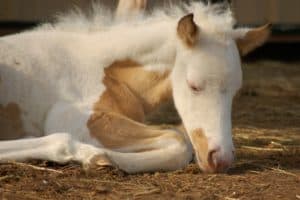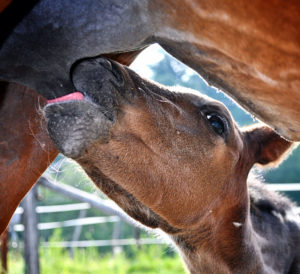
What is Failure of Passive Transfer in Horses?
Approximately 5-20% of newborn foals are diagnosed with failure of passive transfer and are at risk for developing serious medical conditions. Learn more in this visual guide.

Approximately 5-20% of newborn foals are diagnosed with failure of passive transfer and are at risk for developing serious medical conditions. Learn more in this visual guide.

Newborn foals are easy targets for every kind of bacterium, virus, and other pathogenic organism. Here are some steps you can take to maximize your foal’s immunity from gestation to weaning.

Digital and optical refractometers are simple, rapid, and cost-effective methods for assessing failure of passive transfer in foals with moderate to good accuracy, researchers found.

Infection can cause serious illness in neonates. Make sure your newborn receives enough disease-fighting antibodies from his dam’s first milk.

Orphan foals raised with a correct balance of nutrients and monitored for growth, food consumption, and weight gain can be every bit as tall, strong, and athletic as foals raised by their dams.

University of Pennsylvania’s Dr. Michelle Linton describes the how a normal foaling should progress.

Ensure your foal has a smooth start to life and prompt treatment of any issues that might arise.

Do you have a foal due? Learn how to prepare your mare for foaling, care for your newborn, and spot issues early.

A foal’s first hours are fragile. Here, Dr. Peter Morresey of Rood & Riddle Equine Hospital, in Lexington, Kentucky, shares the early signs of trouble to look for in both the foal and its placenta. What you learn might save a foal’s life.

Giving foals hyperimmune plasma did not prevent infection, but it did reduce the severity of R. equi pneumonia.

This important protective system is extremely complex. Here’s a rundown of how your horse’s immune responses function.

Foals with IgG levels lower than 800 mg/dL are more likely to die than those with levels greater than 800 mg/dL.

To a newborn foal, colostrum can mean the difference between life and death.

Find out why foals require passive transfer of infection-fighting antibodies from their mothers’ first milk.
Lactation is a very important function in a mare. So important, in fact, that two lives depend on it. A mare’s body will sacrifice her foal’s health to save her own life … both during gestation and after foaling. In other words, you must feed her
The foal’s immune system is almost a blank slate at birth; researchers are figuring out how to best protect horses as they grow.
Stay on top of the most recent Horse Health news with
© 2022 Copyright Statement dolor sit amet, consetetur sadipscing User Terms, sed diam nonumy eirmod tempor invidunt ut labore et dolore magna aliquyam erat, sed diam voluptua. At vero eos et accusam et justo duo dolores et ea rebum. Stet clita kasd gubergren, no sea takimata sanctus est Lorem ipsum dolor sit amet.
"*" indicates required fields